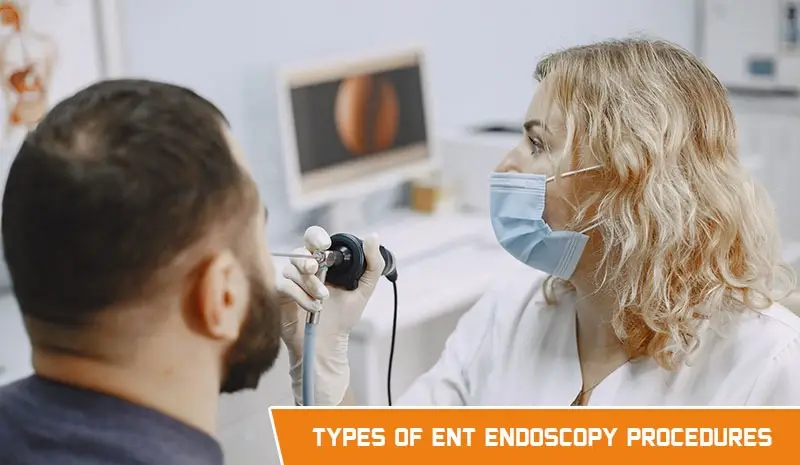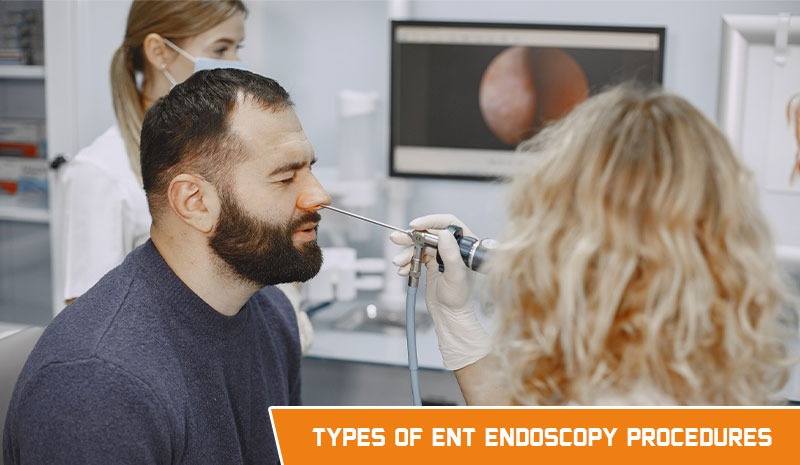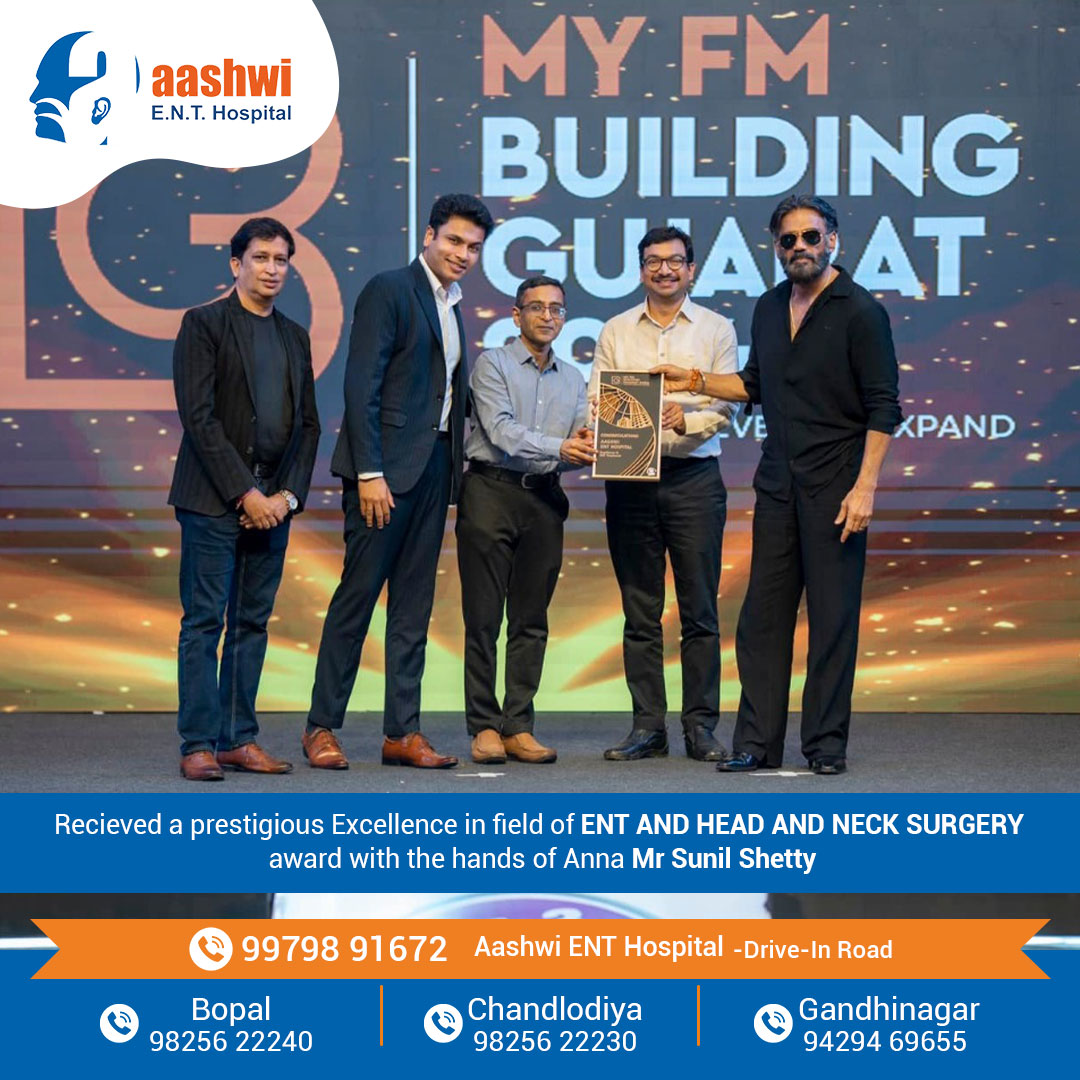
In recent years, medical technology has made great strides, especially in the field of diagnosis. ENT (Ear, Nose, and Throat) endoscopy is one of the most notable innovations. This now represents a rapid, precise, and minimally invasive solution for patients in Ahmedabad to identify and treat a wide range of conditions affecting the nose, throat, and ears.
But what exactly does “ENT endoscopy” mean? And what types are available? This article aims to guide you through the main Types of ENT Endoscopy Procedures, explaining simply what they consist of and why they are so useful. We will also talk about the benefits of ENT endoscopy procedures for patients, from improving quality of life to reducing recovery time.
If you live in Ahmedabad and are looking for answers on how to deal with breathing, hearing, or throat-related problems, you are at the right place.
What is ENT endoscopy?
ENT endoscopy, or ear, nose, and throat endoscopy, is an advanced diagnostic technique that allows doctors to precisely examine the internal structures of the nose, throat,t and ears. Using a thin optical instrument called an endoscope, doctors can see real-time images of the internal cavities, detecting even the smallest abnormalities.
How does it work?
An endoscope is a flexible or rigid tube equipped with a small camera and a light source. It is gently inserted through the nostrils, mouth, or ear, depending on the area to be examined. The images collected are projected onto a monitor, allowing the doctor to observe in detail structures such as:
The nasal cavities
The vocal cords
The ear canal
The pharynx and the larynx
When is it used?
ENT (ear, nose, and throat) doctors recommend an endoscopy when you have persistent or unexplained symptoms such as:
Chronic nasal congestion
Pain or hearing loss
Nosebleed
Hoarse voice for over two weeks
Sensation of a foreign body in the throat
Respiratory difficulties
![Types of ENT Endoscopy Procedures]() Types of ENT Endoscopy Procedures
Types of ENT Endoscopy Procedures
There are different types of ENT Endoscopy Procedures: auditory, respiratory. Each procedure is minimally invasive and is often designed to investigate a specific part of the auditory, upper respiratory, and throat systems. Each procedure is minimally invasive and is often performed on an outpatient basis, without the need for hospitalization.
Here are the main ones:
1. Nasal endoscopy (Rhinofibroscopy)
This procedure is used to examine the nasal cavities and paranasal sinuses. It is very useful for patients suffering from:
Chronic congestion
Respiratory allergies
nasal polyps
Deviated nasal septum
Recurrent sinusitis
2. Laryngeal endoscopy
It is used to observe the vocal cords and larynx, particularly useful for patients with:
Persistent hoarseness
Altered voice
Pain when swallowing
Suspected vocal cord injuries
3. Pharyngeal endoscopy
It examines the back of the throat (pharynx) and is often combined with laryngeal endoscopy. It is indicated for those who have:
Sensation of a foreign body in the throat
Pain when swallowing
Recurrent throat infections
4. Otological endoscopy (Ear endoscopy)
Used to examine the ear canal and tympanic membrane. It is particularly useful for:
Ear pain
Recurrent infections (otitis)
Hearing loss
Perforations of the eardrum
5. Endoscopy with a 3D or high-definition system
modern ENT in Ahmedabad also offer advanced technologies like HD orThe modern ENT facilities in Ahmedabad offer advanced technologies, such as HD or 3D systems even better, for an even more detailed view.
Benefits ENT Endoscopy Procedures Offer to Patients
When your ENT specialist recommends an endoscopy, it’s natural to feel a little nervous. But here’s the good news: ENT endoscopy procedures are designed to help, not hurt. They represent a major step forward in modern medicine, especially for patients seeking accurate answers without the stress of surgery or long hospital stays.
Let’s break down the key benefits ENT endoscopy procedures offer:
1. Early and Accurate Diagnosis
The most critical benefit? These procedures allow your doctor to see exactly what’s happening inside your body in real time.
Whether it’s inflammation in your sinuses or an abnormality on your vocal cords, ENT endoscopy helps detect issues at their earliest stages—often before symptoms get worse. This means quicker action and better outcomes.
2. Minimally Invasive (and Mostly Painless)
Most ENT endoscopies are non-surgical and performed in the doctor’s office.
There are no cuts, no stitches, and minimal recovery time.
Patients typically experience:
Mild discomfort
Occasional gag reflex
Temporary numbness from spray anesthetic
3. No Need for Hospitalization
Unlike traditional surgical procedures, ENT endoscopy:
Doesn’t require admission
It is completed within minutes
Involves no general anesthesia (in most cases)
4. Real-Time Imaging = Faster Decisions
Because doctors can see the problem live on a screen, there’s no waiting for lab reports or exploratory surgery. This reduces:
Stress and anxiety for the patient
Delays in treatment
The need for follow-up procedures
5. Better Monitoring of Chronic Conditions
For patients with long-term ENT issues—like chronic sinusitis, voice disorders, or allergic rhinitis—endoscopy allows for regular monitoring without repeated invasive tests.
This ensures treatments are working and adjustments can be made in real time.
6. Lower Risk of Complications
Because there are no incisions, the risk of infection, scarring, or complications is very low. Most side effects (like mild soreness or sneezing) resolve within hours.
7. Cost-Effective in the Long Run
Fewer complications + quicker diagnosis + no hospital stay = lower medical bills.
For families managing health expenses in Ahmedabad, ENT endoscopy can reduce unnecessary costs while ensuring top-quality care.

 Types of ENT Endoscopy Procedures
Types of ENT Endoscopy Procedures